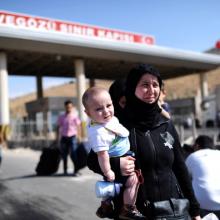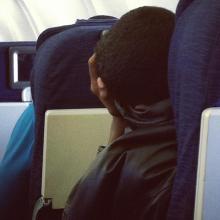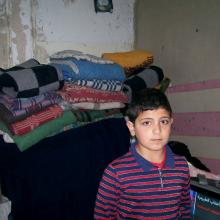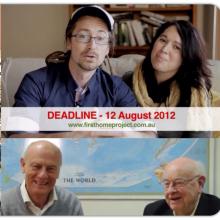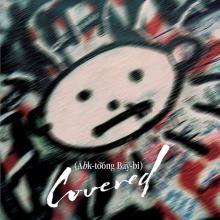Refugees
More than 100 faith leaders and immigration activists were arrested today during an act of civil disobedience outside of the White House. The activists were calling on President Barack Obama to take executive action to immediately stop deportations and to deal with the crisis of unaccompanied minors at the border.
"We have come to Washington, D.C., to tell to President Obama and Congress that kicking out suffering immigrant families and unaccompanied children is not the answer,” Bishop Minerva Carcaño, the United Methodist Bishop in Los Angeles, said. “Immediately stopping the deportations and extending due process to children escaping the violence of drug cartels, gangs and poverty is the just way to respond."
Other participants in the protest saw the struggle for immigration reform as part of a larger struggle for justice.
"As someone who has benefited from the courage and civil disobedience of the leaders of the Civil Rights Movement, I cannot stand idly by as I see unjust immigration laws damage our communities and our nation,” Rev. John L. McCullough, President and CEO of Church World Service, said. “It is a moral imperative that we take action now, particularly after the House Republican leadership has miserably failed to enact immigration reform that the majority of Americans roundly support."
This action comes while the Obama administration is conducting a review of deportation policies and pushing for emergency funding for the crisis of unaccompanied children arriving at the border.
This new hymn is inspired by the crisis in Central America that has caused over 70,000 children to take the dangerous journey to the United States in recent months. Carolyn Winfrey Gillette has led many mission trips to Honduras for the past sixteen years. The brother of a child that Carolyn sponsored in Honduras was recently killed there.
The hymn’s reference to “On one boy’s belt, a number carved in leather” is from a news report ("Boy's Death Draws Attention Immigration Perils") of a body of a dead child found with his brother’s phone number on his belt.
“As angry crowds are shouting, “Go away!” comes from the news reports of Americans yelling at the detained children on buses in Murrieta, California. Jim Wallis of Sojourners reflects on this incident in his powerful online essay “The Moral Failure of Immigration Reform: Are We Really Afraid Of Children?" Biblical references in the hymn are Matthew 25:31-46 and Matthew 19:14-16.
I am not a politician, so I’m not an expert on immigration policies.
I am not an economist, so I’m not an expert on the economic benefits or burdens of immigration.
But I am a public theologian. I try to understand how we can participate with God in setting things right, healing the world, and reconciling human beings with one another, with the world, and with God.
“We will not only win victory for ourselves; we will appeal to your heart and conscience that we will win you in the process and our victory will be a double victory.” – Martin Luther King, Jr.
Four years ago I was working a corporate job for a national AFL team. It was well paid. I had great opportunities. Life was good. If you had told me that I was going to become a Christian, I would have laughed in your face. If you had gone on to say I would leave my well-paid job to spend my days running a Welcome Centre for refugees while working side jobs to make ends meet, I would have questioned your mental health. If you had added that I would be arrested with church leaders and a rabbi while continuing Martin Luther King’s work, it would have certified to me that you were crazy.
On Monday I walked into Austrailian MP Jamie Briggs' office to be arrested with seven Christian leaders and a rabbi. It sounds like the start of a joke. (My life is teaching me God has a great sense of humor.)
Why were we arrested? There are 983 children and their families currently in Australia’s detention centers.
These children are kids just like our own, with their made-up games, whispered jokes, and giggles. Their families dream of a future of safety. Our incoming Governor of South Australia, Hieu Van Le, arrived by boat in Darwin seeking refuge 36 years ago, with “nothing but a suitcase filled with invisible dreams. A dream to live in a peaceful, safe and free country and to live a meaningful and fulfilling life.” In the past, Australia has been the kind of nation that grants dreams like this – why not for the 983 future Hieu Van Le’s and their families in detention?
A world away and so many years later, how is Martin Luther King’s freedom movement related to the current plight of asylum seekers in Australia? Well, the links are stronger than you think.
Last week amid the closing of the Olympics, the national debt, and the latest pop culture ‘news,’ this photo was published that encapsulates the volume of pain and suffering that is happening in Syria. For years, the conflict in Syria has gone through its ebbs and flows; it has been in and out of the media’s attention. Even though thousands of people have been displaced and families have been forced to eat animal feed, this is not worthy for American front-page news. Sadly, travesties around the world, or even in our backyard, are categorized as “out of sight, out of mind.” Too often we are consumed by other things than those outside of our limited purview.
When I saw the photo of the suffering of the Syrians, I was shocked; I was shocked that so many people were in line to get food, shocked that despite their best efforts there is not enough food to go around. I felt sad for the people who, by no fault of their own, live in a country that is being ravaged by war, violence, greed, and power struggles. I felt embarrassed for all of the times I whined and complained about my own “problems.” All of them collectively wouldn’t even begin to compare to what people are facing in Syria at this very moment. I wanted to find a way to do something, to raise my voice for them ... anything.
African church leaders are urging parties in the South Sudanese conflict to respect places of worship, after rebels attacked and looted church compounds in the town of Malakal.
The Roman Catholic Cathedral of Malakal was looted at gunpoint, forcing priests, and civilians to flee, a regional church leader said.
Catholic and Presbyterian churches, a hospital and an orphanage have become safe havens for refugees escaping the fighting in the city.
“I came to know myself what it means to be asked for something under the threat of a gun when a group in uniform stopped me on the way from the hospital to the church,” said one Catholic priest, who did not give his name because he fears for his safety. “They blocked me and took my watch and a key.”
The fire in the Chaman e Babrak camp in Kabul, Afghanistan, began in Nadiai’s home shortly after noon. She had rushed her son, who had a severe chest infection, to the hospital. She did not know that a gas bottle was leaking; when the gas reached a wood-burning stove, flames engulfed her mud hut and extended to adjacent homes, swiftly rendering nine extended families homeless and destitute in the midst of already astounding poverty. By the time seven fire trucks had arrived in response to the fire at the refugee camp, the houses had burned to the ground.
No one was killed. When I visited the camp, three days after the disaster, that was a common refrain of relief. Nadiai’s home was on the edge of the camp, close to the entrance road. Had the fire broken out in the middle of the camp, or at night when the homes were filled with sleeping people, the disaster could have been far worse.
Even so, Zakia, age 54, who also lives in the camp, said this is the worst catastrophe she has seen in her life, and already their situation was desperate.
I have read countless articles from political, religious, and ethical perspectives on why or why not the U.S. should militarily intervene against the Syrian regime. Most do a decent job evaluating the situation, but I have yet to read one that really puts the human element on the table as a deciding factor.
A few months ago I was going to bed in my hotel room in Tel Aviv when I saw the breaking news alert that there was rocket exchange between Hamas and Israel in and around Gaza. While I have been to many places in "conflict," there is something much different about being somewhere that is only miles away from live fire.
I started playing out the situation in my head: "What if this expands into a major conflict? Can I catch a flight back home to be with my family before it gets worse? I'm only 30-40 miles away from the active conflict, am I already in range sitting in this hotel room?"
Anxiety. Fear. Uncertainty.
Now let me be clear, that experience of anxiety and fear is NOTHING compared to what most Israeli's, Palestinians, Egyptians, or Syrian's have felt in recent years (and MANY other populations). But — even if only in some small way — I could immediately feel the weight of pending war. It is palpable. It is crippling. And if I had my family with me, it would have potentially been unbearable.
When a head of state is responsible for the deaths of 100,000 of his people and has used chemical weapons against innocent civilians — the world needs to respond. In one massive attack, the evidence appears to show that 1,429 people, including 400 children, suffered horrible deaths from chemical weapons banned by the international community. That is a profound moral crisis that requires an equivalent moral response. Doing nothing is not an option. But how should we respond, and what are moral principles for that response?
For Christians, I would suggest there are two principles that should guide our thinking. Other people of faith and moral sensibility might agree with this two-fold moral compass.
LIKE MANY Palestinians forced from their homes during the 1948 war, relatives of Jordan’s Sen. Haifa Najjar carried the keys to their Palestinian homes with them as they fled. These keys, passed down through generations, are powerful symbols of Palestinian ties to the land that international law considers theirs—even as their hope for return wanes.
As a Christian appointed by King Abdullah II to Jordan’s upper house of Parliament, Najjar is active in the education, environment, cultural, and legal sectors of the government. She is also superintendent of the Anglican-run Ahliyyah School for Girls and Bishop’s School for Boys in Amman, Jordan.
Within the mix of the 500,000 Palestinians who relocated to Jordan because of the Israeli War of Independence—or Nakba, “the catastrophe,” depending on who you ask—was a vocal minority of Palestinian Christians who joined their ranks with the existing Jordanian Christian community. Prior to 1948, Christians accounted for nearly 20 percent of the population of what is now Israel/Palestine. Today that figure is less than 2 percent. Even more dramatic are declines in the West Bank cities of Ramallah and Bethlehem. Christian populations are nearly extinct in these locations compared to their respective majorities of 90 and 80 percent prior to 1948.*
“They moved not as immigrants; they were initially thinking it was a temporary thing,” says Father Nabil Haddad of the Melkite Catholic Church in Amman. “It is similar to what Syrians are thinking right now when crossing the barbed wire, not the checkpoints, between south Syria and north Jordan.”
OUR PLANE SITS at the gate in Brussels well past our departure time. Slowly, the empty seats fill with Somali refugees whose flight a day earlier had been cancelled. After a night in the airport, they slide wearily into scattered seats.
Ten years together in a refugee camp in Uganda has melded the group into a close-knit family. What do they feel now, I wonder, knowing that on the other end of this flight they will scatter, not to empty seats but to unknown cities throughout the U.S.? From Syracuse to San Francisco, they will look upon a world they have never imagined. “When will I see my friend?” one little girl asks, not realizing she and her friend will live half a continent apart.
I watch a man a few rows ahead of me. I learn from his friend that he suffers from headaches. I know enough about refugees to realize headaches will likely be the least of his challenges. He and his family will face a confusing culture, strange language, unfamiliar religious practices, unknown yet required skills, and new technology—from flush toilets to garage door openers, from light switches to iPads. Then they’ll have to sort out schools and jobs and health care. They’ll be starting over, basically, with nothing.
Almost nothing. One suitcase per person contains the bit of their past they carry into their future. These slim and elegant humans are traveling very light. Unless, of course, you count the weighty baggage of war and displacement.
Climate scientists have warned that climate change will bring about—and already is bringing about—more frequent and fiercer storms. But climate change leads to far more than just destructive weather patterns, with consequences in almost all aspects of our lives. Here are just a few of the many possible effects of our rising global temperature.
Natural disasters will increase.
Climate change increases the risk of natural disasters that disproportionately affect low-income people who lack the resources to prepare, recover, or relocate.
Food will be scarcer and more expensive.
Food prices increase as farmers face new levels of unpredictability in weather patterns. Drought and floods may cause widespread soil infertility and increased plant diseases.
We'll experience more drought—and floods.
Changes in weather patterns lead to both increased drought and flooding, because warmer air can hold more water. Many dry places will become drier, while others will be inundated with rain.
ON SEPT. 23, 2003, Steven Kim was arrested and later escorted into a detention center in northeastern China with bound hands and heavy chains on his feet. His crime? Helping undocumented migrants—North Korean refugees—in China.
After decades of famine, mismanagement of resources, and a severe state-controlled system, the Democratic People's Republic of Korea—more commonly known as North Korea—has evolved into one of the most secretive and isolated countries in the world. About 2 million people have died since the 1990s, and still the country cannot feed its people without foreign aid. This shortage of food has driven thousands of North Koreans to migrate illegally to China by crossing the Tumen River in search of food and respite from the totalitarian regime.
Before his imprisonment, Kim—a Korean-American businessman from Long Island, N.Y.—lived in China and operated a furniture business. As a non-denominational Christian, Kim became a member of an unregistered house church in Shenzhen, which operated outside the Chinese government's control. After meeting Tae Nam, a North Korean man, and hearing his desperate story firsthand at his house church, Kim was instantly drawn into the underground railroad of supporters of North Korean refugees.
AFTER SEVEN MONTHS at a detention center, Kim was sentenced to five years in prison, under Article 318 of the Chinese criminal code, for helping undocumented North Korean migrants and harboring them in his home.
WHEN A GROUP of refugees from Burma who attend my church in Melbourne, Australia, asked me to co-lead a study of the book of Revelation last year, at first I was apprehensive. After all, the book is strange and confusing. Many, including Martin Luther, have asked whether it’s even necessary to include it in the New Testament. But, as our group plunged into Revelation’s mysterious depths, I was to learn that, unlike Western Christians, praying refugees readily see its lessons about the powers of evil—social, political, spiritual, and personal—and the decisive struggle that the Son of God mounts against them.
The 18 young women and men in the study, who ranged from 16-to- 24-years old, were members of the Karen ethnic group. The civil war in their home region of Burma has, over decades, resulted in massive displacement and suffering. In recent years thousands of Karen people have resettled in the U.S. and other countries, including Australia. (Although current political developments in Burma raise cautious hope of eventual peace, at present fighting continues in Karen State and other areas inhabited by ethnic minorities.)
Leading the study of Revelation with me was Thara Nonoe, a Karen man in his mid-50s highly esteemed in the community for his skills in imparting knowledge and writing poetry. (“Thara,” which means “teacher,” is a Karen title of respect.) The young always listen to him keenly. Our six-part study was a segment of a two-year series of lay religious education. As I prepared, I was haunted by Peter’s sermon on the day of Pentecost: “In the last days, God declares, I will pour out my Spirit” (Acts 2:17). Pentecost signifies that the last days have arrived, in fulfillment of the words of the prophet Joel. In my mind, these words have particular reference to oppressed believers such as Christian refugees.
At the corner grocery in our Jabal al-Webdah neighborhood of Amman, a Syrian man in his early 20s now runs the meat and cheese counter. Ahmed (not his real name) is one of more than 150,000 Syrians who have fled to Jordan since his country’s violence began in March 2011.
Young males seeking to avoid mandatory military service are one of the largest groups leaving Syria.
Ahmed wires his wages to his family in Syria and calls them each evening to be sure they are still safe. “The situation inside Syria is even worse than reported in the news,” he laments.
A recent UNHCR report notes that, increasingly, Syrians are arriving in Jordan with only the clothes they are wearing and with few economic resources after months of unemployment.
In the Australian city where I live, there is a housing crisis.
Only 2 percent of rental properties are vacant. The mining boom has seen a huge increase in the number of renters and this additional competition has left parties outbidding each other to lease the few rental properties on the market.
In this environment, immigrants, generally, and refugees in particular, struggle to access affordable accommodation, let alone accommodation close to employment opportunities or community services.
In the community I helped found and where I have spent the last eight years — going through the highs and lows of radical hospitality, direct action, gardening, praying, and cups of tea — we feel called to leave.
Who is a refugee in our world today? How does one receive “refugee protection” and is this determination fair and just? On World Refugee Day 2012, June 20, we remember those who have fled persecution because of their ethnicity or country of origin, religion or political views.
These atrocities are serious and asylum an appropriate response. The UNHCR reports that 800,000 people became refugees in 2011, while a total of 4.3 million people became newly displaced (mostly hosted in Africa and the Middle East).
The band may be taking a well-deserved break from touring and recording, but U2 fans still have a new album to relish just in time for Thanksgiving.
Ǎhk-Toong Bāy-Bi Covered features cover versions of U2's famed 1991 album Achtung Baby featuring renditions by Snow Patrol, The Fray, Patti Smith, Damien Rice, Depeche Mode, Jack White, The Killers and others.
And all proceeds from the album's sales will go to help some of the estimated 13.3 million Africans suffering through the worst drought and famine in 60 years.







